#we need more mass transit in us America
Explore tagged Tumblr posts
Text
Braille/Large Print Scripture Resources for Free
Xavier Society provides free religious, spiritual, and inspirational reading materials in braille, large print and audio to blind and visually impaired individuals worldwide. Please note that I am not affiliated with them, but I have copied their descriptions for the resources they provide without editing them just to ensure they are clear. If you have any questions, please get in touch with them as I will be unable to help you.
If you are someone that is vision impaired or blind, there are a range of resources that you can access for free. If you are a Priest, lead Catechism classes, Bible studies, or do any kind of outreach, then you can also access these resources for free to provide to anyone that is vision impaired or blind. Please do consider adding these resources to your Church or Christian organisation in order to provide accessible options for those in need.
All of the below resources are completely free, and there is no cost for signing up.
Mass Propers (Missalettes) in Braille
One of our most important and popular publications is The Propers of the Sunday Mass – these are the readings, responses and prayers for the Mass on Sundays, special Feast Days and Solemnities. The Propers are mailed out to patrons two months in advance, so they are sure to arrive in plenty of time for patrons to prepare for Mass. The Propers are also available for download in .BRF, audio, and large print (rich text format).
Textbooks for CCD and RCIA in Braille
Did you know that we were founded in 1900 to provide young children with braille textbooks? We continue to make this a priority. Learn more about textbooks and other braille offerings for children and young adults by clicking here. If you are an adult and need materials for RCIA, please get in touch! You can reach us at [email protected] or calling us at 212-473-7800 or 800-637-9193.
New American Bible in Braille
We can send out individual books of the New American Bible (Old and New Testament) upon request! This is the translation approved by the United States Conference of Catholic Bishops (USCCB). In addition to hard copy braille, the entire Bible is available in .BRF for download from our website. We also have a collection of Bible stories for children available in our braille library.
Periodicals in Braille
Xavier Society for the Blind has a long history of making the best in Catholic literature and information available. We provide The Catholic Review, our magazine that is distributed in braille three times a year. It is a compilation of outstanding articles from periodicals such as America magazine, Catholic Digest, Our Sunday Visitor, Maryknoll, and many more.
In addition to The Catholic Review, we also send out our magazine The Xavier Review, three times a year in braille. The Xavier Review rounds up the latest news from Xavier Society, recent additions in braille and audio, and other useful information. Both The Catholic Review and The Xavier Review are available for download in audio and BRF for patrons on our secure online catalog. If you are a client and in need of your log-in details to download audio or BRF files, please contact Client Services at 212-473-7800 or [email protected].
New American Bible in large print
The New American Bible (Revised Edition) is 13 volumes in total and available in size 22 font, sans-serif. That's pretty large! This translation of the Bible is approved by the United States Conference of Catholic Bishops (USCCB). Read the Gospels, Old Testament, New Testament - whatever you desire! We also provide the New American Bible in braille and Talking Book. This essential resource is provided free-of-charge, as are all of our materials.
Talking Books
In 2019, Xavier Society for the Blind transitioned to digital Talking Book format so that our patrons could listen to our books on the talking book machines provided for free by the National Library Service for the Blind and Print Disabled (NLS). Digital Talking Books are produced on cartridges, a technology that is very accessible and user-friendly for people with sight loss. If you need more information on how to obtain a Talking Book machine from the NLS please get in touch. We'd be happy to provide you information on obtaining one of these machines free-of-charge from your state library.
How to register
In order to register for these free resources. Please visit their web page on how to register at: https://xaviersocietyfortheblind.org/register-for-services
How to support
If you are interested in supporting this organisation. You can find ways to support and donate on their site here: https://xaviersocietyfortheblind.org/support-our-mission
Please also consider sharing this post or letting your local Catholic Church know to access this resource.
26 notes
·
View notes
Text

So, context: I'm in the Tucson, Arizona branch of the Democratic Socialists Of America. They need to get this out to more social media sites, and I volunteered my Tumblr. So here we are.
For further context, there's currently a debate in Tucson on what programs and services to cut. There's a lot of things they want to cut that they really shouldn't, including our big Free Mass Transit program.
So, this is to get folks to do the survey (Deadline is Friday, April 11th, 2025) to tell them no, don't do that, just increase the taxes by a bit and cut the cops. So, if you live in Tucson, please take the survey, and if not, please boost this so someone in Tucson might find it.
Full transcript past the break, because it's way too long for an alt-text:
------------
Your Money Matters! City of Tucson is asking YOU what services they should KEEP & what they should SLASH this year. TELL THEM!
This guide is for those who want to engage in collective action with others when filling out the FY2026 Budget Survey for Abolition & Housing Justice!
Don't Wait! The Survey Closes Fri, April 11th (Date changed from Friday, April 8th on the original) at 4:59 PM
Tucson’s Fiscal Year 2026 Budget Survey:
People should feel free to follow their hearts on the survey. Your voice DOES matter. If you choose to use your voice for collective action, here are some recommendations.
Words and phrases in BOLD are ones we want people to use specifically.
There are some #hashtags suggested. Feel free to use all or none of them!
Q1) Choose 8 Priorities:
Affordable Housing
More Firefighters
Fund early education
Substance Use Help
Homelessness Support
More Shade and Trees
Job Skills Training
More Arts and Culture
Q2) Are there expenses in the City's General Fund that you consider to be wasteful/unnecessary that the Mayor and Council should examine cutting? Limit to 4 sentences.
Example:
#lesspolice #carenotcops
Nearly 1/3 of the general fund is taken up by police personnel. The current high number of uniformed officers and surveillance technologies like cameras are a waste of city money when many tasks TPD does could be eliminated with a better public safety strategy.
Q3)
Are there city service changes you think would save money and or improve impacts for the community and visitors that the Mayor and Council should consider adjusting?
Example
#replaceTPD #freebuses #CBVI #morehousing
Replacing police services with community-based violence prevention and intervention would be a big improvement. Moving money away from police services upstream towards social services, transit services, & climate resiliency would be more cost effective.
Q4)
What options should the city explore for new or increased dollars to help solve its projected deficit? Number with 1 being your top priority, and 6 being your last priority:
Suggestion:
1) Increase the local per-night-stay Bed surtax
3) Advertising tax
2) Secondary Property Tax
4) 1/4 cent sales tax
5) DO NOT SELECT
6) DO NOT SELECT
Transit fare -DO NOT SELECT - do not add a 5th or 6th priority
Please leave transit fare unranked
Q5) What additional Thoughts or comments do you have regarding the City's FY26 budget development? Limited to 4 sentences:
For this question, we wanted to highlight how badly the city manager’s office had bungled the public participation for FY2026.
Example:
The budget should be participatory
A rubber-stamp public participation program conducted like this, rushed & inaccessible to Spanish speakers, lowers trust in the government
Stop lumping fire service with police
Keep transit free, fund housing & services to unhoused, raise unarmed city worker wages
25 notes
·
View notes
Text
crystal's tunes #2: WORRY. by Jeff Rosenstock (2016)
i was going to wait a while before talking about this album, but i mean come on, it's literally got a track called June 21st. if i was gonna do it any day it'd be today.
WORRY. is an album that's very special to me. i originally discovered it via James Acaster's book Perfect Sound Whatever (named after the closing track of the album), and in the years since it's become one of my most listened to albums of all time. i'm not going to link any specific songs here, because i feel like the album is meant to be listened to in its entirety.
this was the second studio album Jeff released after the end of his previous project, ska-punk collective Bomb the Music Industry!, which in itself was born out of the end of his previous-previous project The Arrogant Sons of Bitches. this album really feels like a culmination of all of his work leading up to this, refined to a T and bursting with energy.
"We're not stupid people but this financial oppression has got everyone believing all that we can do is nothing/'Cause we organise through avenues they lace with advertisements so the ones we rage against are still lining their pockets" - Festival Song (Track 3)
thematically, the album discusses a variety of issues with modern-day America, such as landlords/gentrification, the coroprate sponsors of festivals and culture, social media mining your data, police brutality, and how the world just keeps getting worse due to capitalism in general. this is especially evident on tracks such as Festival Song, Staring Out The Window at Your Old Apartment, Blast Damage Days, HELLLLHOOOOLE, and The Fuzz, but is present throughout the album. he also touches on some more personal issues, such as alcoholism and the struggles of being a DIY musician.
the production here is absolutely top-notch, every single element is balanced perfectly, guitars are clear and crushing when they need to be, drums are punchy, vocals cut through well and instruments such as saxophones, glockenspiels and synths are used in certain songs to offer various different sonic textures. its not just the instruments that are varied here though, he also travels across a number of styles such as his classic ska-punk on the 91 second track Rainbow, to more hardcore punk on 30 second track Planet Luxury.
the A-side of this album is fantastic, with tracks like We Begged 2 Explode, Pash Rash and Festival Song becoming fan favourites and staples of his live sets, but i think this album really comes into its own during it's B-side. every track from Blast Damage Days through to the final track Perfect Sound Whatever perfectly transition into each other, creating a medley of different punk subgenres that is absolutely incredible. it's cathartic and danceable all in one, and its one of my favourite things he's done on an album.
"Whenever we feel ashamed, being alive and awake in such an era of hate and military police/These are the mass murder days, we are the blast damage age, where we can't love anything, because they keep us afraid/Oh, I will be there, kicking, fighting, beating, screaming 'There's no fucking way I'm ever letting go of you!'" - Blast Damage Days (Track 9)
the album builds up in energy until its final anthemic, gang vocal repetitions of "Perfect always takes so long, because it don't exist/It doesn't exist!", which is one of Jeff's main mission statements creatively. the first Bomb the Music Industry! album Album Minus Band has anti-piracy hiss throughout from various plugins he used the demo versions of instead of buying, and a track that's project files corrupted so he couldnt mix it properly, but all of that just adds to the artistry of it all. nothing can ever truly be perfect, so just be honest and authentic and do what you want, because in both art and people, our imperfections are what make us whole. i'm not a perfect person, and that's alright. i may have my own anti-piracy demo plugin hiss in my brain, but that's just part of what makes me myself - i wouldn't truly be me without it, and that's beautiful.
i think this album is truly great because despite the overwhelmingly negative topics being discussed, in the end its hopeful, even if the world or your life seem like theyre fucked, there's always a light at the end of the tunnel. the penultimate track ...While You're Alive, ends with the verse "And it's not like the love that they show us on TV/It's a home that can burn, it's a limb to freeze/It's worry/Love is worry". this can just be taken at face value as the fact that when you love someone you worry about them, but i interpret it a different way, especially with the context of the rest of the album.
when the government and systems are against you, you're fighting your own brain, and you're overwhelmed with worry, that worry is coming from a place of love, because you wouldnt worry about something you dont care about. you love yourself, you love the world, and in a way, your anxieties are really just a form of expressing your care and love even if it feels like fear, and anger, and sadness. and, for me at least, that's one of the most reassuring messages i've ever been given from an album. thanks, jeff.
"Because it's June 21st, and this winter was the worst we've ever seen, but we made it through the freeze/And now it's June 21st, and this winter was the worst we've ever seen, now it's 84 degrees forever." - June 21st (Track 14)
#music#music review#jeff rosenstock#album review#bomb the music industry#btmi#punk#power pop#punk rock#ska punk#music blog#crystalstunes
14 notes
·
View notes
Text
Garden Cities
Our group believes that the garden city is the most versatile, applicable, and beautiful theoretical concept. Garden cities, especially if combined with city beautiful concepts, can provide valuable outdoor space, fresh air, and light to compacted city dwellers.

We see three major conceptual scales of garden cities, with the largest being the most difficult to construct, and the smallest being the easiest. We call this achievability. In this post we will look at achievability, along with usability, modularity, efficiency, and sustainability.
Achievability
Large Scale Garden Cities
Large Scale Garden Cities, like Garden Cities of To-morrow by urban planner Ebenezer Howard, is a large scale plan, to develop a vast region into a collective city. While visionary in its approach, and understanding of human desire, it lacks achievability due to it's vast scale. The only way a plan such as this could be implemented would be in consequence of mass destruction. These type plans can use their large scale to create great efficiencies, such as population centralization or grouping like land uses.

Medium Scale Garden Cities
Most frequently implemented, medium scale garden cities typically interpret the idea of open space as preserving areas as parks or using them for farmland. These take the form of greenbelts or green-fingers. This is contrasted to the unplanned open space form affectionately named 'spots'. A few quintessential examples, as well as a few local examples are listed below in their respective categories.
Green Belt
The green belt, pioneered by the British for London, was the answer to maintaining access to the countryside for the metropolis. London's greenbelt was inspired by Howard's original plans for garden cities. While very effective, few modern cities have greenbelts, especially in America. Portland, Oregon is notable for having a greenbelt, made possible by legendary environmentalist Tom McCall.
London

Portland

Green Fingers
The green fingers approach solves the early 20th century's problem with city dwellers access to light, air, and the countryside. It often takes shape as parklands in between developed areas. Helsinki, Finland pioneered this idea in the mid 20th century, and it has since spread to other cities in the world. In some places, like in Louisville, Kentucky, it was seeded with an Olmsted master plan in the 20th century, and has been mostly maintained in growth patterns.
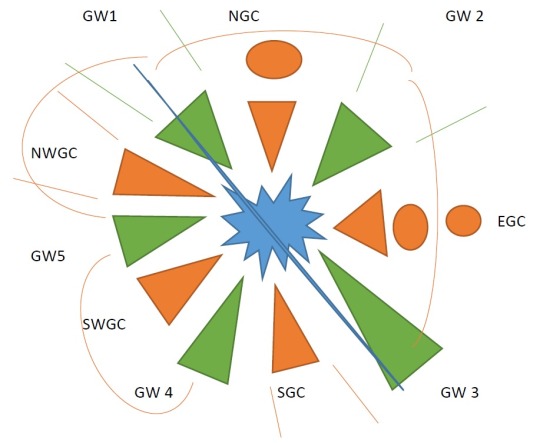
Helsinki


Louisville

'Spots' (not a garden city concept) (for comparison)
Take note of the large swathes of land where it would take hours to get to any place that could be considered 'undeveloped'.
New York

Small Scale Garden Cities
The idea of small scale garden cities has yet to be realized in real life. Best implemented in rural areas, near to a city, these would take shape of a co-operative high-rise, multi-purpose building, surrounded by a co-operative farm. With a food source this close to a population center, it allows residents to be far more intimate with their food supply. This would be adjacent to a mainline railway station, with relatively frequent trains to the city. This would also be an effective tool against unruly growth in small towns, as a method of efficient, planned consolidated growth, where the density is great enough, to have an acceptable cost to service. Fenley's personal favorite example of this is Solving the Housing Problem by Hugo Gernsback, a magazine editor, and the inventor of modern day science-fiction.

Image restored by Fenley Jones
Usability
A garden city could easily be more usable than a city with a traditional development pattern. There are several ways this is achieved. Centralizing density, there becomes a far more likely chance that the place you want or need to go is close to the place you are coming from. With transit is planned in from the beginning, connecting to these population centers, making it easy to travel further if necessary. Additionally, will more people in a smaller area, it becomes a challenge for a person to put themselves into social isolation as many inadvertently do in modern cities. Lastly, mass employers are accessible nearby, making it easier for all people to find employment, no matter their skill level.
More still, with gardens surrounding the city center, social environments are within easy access, along with leisure and pleasure areas.

Modularity
If realized at the greatest scale, in form of city-nodes, modularity can be achieved. In a network of numerous nodes of different types, resiliency is created. This could lessen logistical burdens, simplify access routes, and provide for an efficient network. For example, if a city-node along the coast is subject to some natural disaster, the other city-nodes can absorb some of the impact from this city.

Efficiency
Separating the various uses of the city diligently, as proposed in the concept by Ebenezer Howard, could potentially create great efficiencies. Such categorization could potentially take advantage of economies of scale, minimize distance goods and services travel, and simplify understanding of an area by it's citizens.
Sustainability
Lastly, garden cities, and cities that implement garden city concepts can be very sustainable.
By concentrating the population, it put more people and services within closer reach of other people and services, and when these people need to access further away people and services, it is efficient to transport them there.

By centralizing housing and planning, it allows for blocks of modular, easy to manufacture housing. Known in western vernacular as Commie Blocks, as the USSR made extensive use of modular, easy to manufacture housing to quickly and cheaply improve the living conditions of its people.
youtube
By developing more on less land, the land is free to be left undeveloped, or landscaped for the benefit of the citizens. For example, in the plan by Ebenezer Howard, only 1000 out of 6000 acres are used for development therefore leaving 5000 acres free for animal habitat, recreational space, and natural areas.
By zoning special areas far away from the population center, it can reduce pollution for the residents. Additionally, the Large number of trees and vegetation, can assist in removing pollutants and absorbing noise pollution too.
With such prominent and abundant vegetation, any person is close to nature at all times, while still being able to access the amenities of a city.

With centralized population and business centers, public transportation is available to the citizens, and service is as efficient as possible.
Sustainability in the sense of long-term vitality is not forgotten either. In concepts with co-operative ownership, rent and revenue would pay for government services, and lead the city to long term financial stability.
In summary, sustainability in a garden city is just one aspect achieved by concentrating development, preserving natural spaces, reducing pollution, and planning public transport into daily life. Their design integrates long-term environmental, social, and economic resilience, as a model for urban growth.
Written by Wade Hayden, Matthew Sayers, Logan Kiser, Myles Edlund, and Fenley Jones
Edited by Fenley Jones
#garden cities#twentieth century planning#retrofuturism#urban planning#land use#agriculture#university of cincinnati#daap#Youtube
2 notes
·
View notes
Text
This Black History Month, Feeding America is celebrating the Black inventors who had a profound impact on our mission.
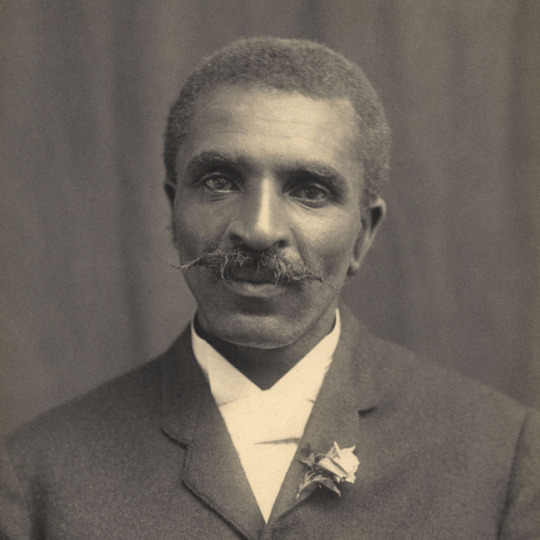
People like George Washington Carver, also known as Mr. Peanut for his revolutionary work creating new products from a single crop, the lowly peanut. And Alice H. Parker, a Black woman who never got the credit, or the fortune, for inventing what we now know as zoned home heating using natural gas. These trailblazers helped America transition to a major agricultural exporter. Their inventions helped farmers increase the harvest to the point that American farmers now feed the world, and those in need. At Feeding America, our work is tied to moving food from farmers to food banks. It is our mission to end hunger in America and many of these Black inventors helped pave the way for U.S. farmers to grow more food.
George Washington Carver (1861-1943)
Born a slave in 1861, George Washington Carver went on to become one of the most prolific agri-business inventors in American history. He invented crop rotation, and more than 300 uses for the peanut. including Worcestershire sauce, cooking oil, and cosmetics. His work is at the foundation of modern farming. It is because of crop rotation and the introduction of grain crops like corn and soybeans, that Feeding America can help our food banks provide for our neighbors in need. Carver helped American farmers feed America.
He was the first African American to earn a bachelor’s in 1894, then a master’s degree in agricultural science from what’s now known as Iowa State University. Carver invented crop rotation. Farmers were struggling to grow anything after years of harvesting a single crop. Carver suggested they plant peanuts, soybeans, and sweet potatoes which would add nutrients to the depleted soil. This method gave farmers a second chance at becoming leaders in agricultural exports.

It would be impossible for the Feeding America network of food banks to get the much-needed food they need to nourish feed our neighbors without the work of this man, Frederick McKinley Jones. He invented refrigerated trucks, which help food banks provide fresh produce and meat to their communities safely. And, because of his work, food banks can rely on our massive distribution network to transport fresh produce from farmers across the country on a regular basis. In fact, our network moved 3.8 billion pounds of dairy, produce, and meat -- perishable foods that wouldn’t be available were it not for refrigerated trucks, trains, planes, and ships.
His work revolutionized global logistics. It’s at the heart of what’s now known as “the supply chain.” That is, he made it possible to transport perishable food safely from one place to the next. He co-founded the U.S. Thermo Control Company (Thermo King) which was worth millions by 1949 and later acquired by Westinghouse.
A self-taught mechanic and World War I Army veteran, Jones received more than 60 patents for refrigeration as well as X-ray machines, engines and sound equipment. He was the first African American to receive the Presidential National Medal of Technology.
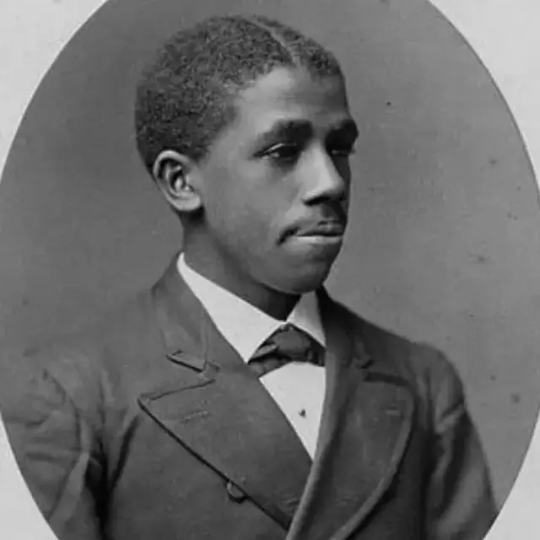
A farmer and a free man before the Emancipation Proclamation, Henry Blair invented two devices to increase agricultural productivity. The first was the corn planter in 1834, and the second was the cotton planter in 1836. His goal was to reduce inefficiencies from manual labor. The Mechanics Magazine published August 6, 1836, described it as “saving the labor of eight men.” Blair’s discoveries helped farmers grow more food for the masses, not just their local communities. For Feeding America, farmers are at the heart of what we do. A large percentage of the food our neighbors receive at their local food pantry is packaged right on the farm where it's grown thanks to our partnership with the USDA. Inventions like Blair's are what fuel the heartland.
While not at the heart of our mission, Feeding America often helps people in need who have to make the tough choice between paying for heat or buying food. During cold winter months, there are many who choose to pay their heating bill and forsake food. They turn to their local food pantry as a stop-gap. The Feeding America network of food banks provides a safe, consistent place for families in need to access food.

Alice H. Parker, the mother of modern heating, invented the gas-forced air heating system because she too wanted to provide a safe place for families.
Before her invention of the gas furnace, home heating wasn’t safe. Homes were heated with coal or wood-burning fireplaces. Parker was the first to develop natural gas as a cleaner, more efficient alternative to home heating in 1919.
An unsung hero of home heating technology, she revolutionized how we live today. But Parker didn’t have an easy go of it as a Black female inventor. The Civil Rights Movement had yet to give African Americans their rights and the Women’s Liberation Movement was further off. She never profited from her invention. So, we salute her. We know there are many families that struggle with tough choices these days with the rising costs of home heating. But for those who have a warm place to sleep and the modern advances of zoned heat, the next time you adjust the thermostat, say a silent thank you to Alice H. Parker.
5 notes
·
View notes
Text
Words I wish I wrote, stories I wish I told - Part 1
In my experience, nothing ever wraps up in a neat little bow. There's always loose dangling threads and things left undone. For a variety of reasons (which I'll touch on), there's a couple of research ideas that I never got the chance to execute in, but I'm unable to completely move off of or put away. They just keep rattling around in my head. So I'll throw them here and maybe sometime I'll be in a position to return to them or someone else might be able to take the concept.
Concept: Embedding sustainability into sport infrastructure standards

When it comes to sports and sustainability, the venue is often a troublesome aspect. In North America, it's typically funded by a combination of public and private funds, it sits as a monolith in a field of parking lots, it requires vast quantities of power: electricity to power it, petroleum to fuel the vehicles that transport fans, staff and athletes to and fro. Depending on the sport and location, this arena, stadium, field or park may also sit vacant and unused for swathes of time.
(as an aside, Alan Cross had a great little segment on his Ongoing History of New Music show, about how reunion tours for popular bands from 20 years ago, etc, exist, in part, because stadium and arena owners need to find ways to fill their venue when their primary tenant is not there, and for a litany of reasons, like streaming music, the decline of conventional media, and dispersal of disposable income, we're not creating music stars the same way we were 25 years ago)
These venues often suffer from one other calamity: they typically have a short shelf-life, with some research pointing to them outliving their usefulness after roughly 25 years.
None of these dovetails nicely with a team's or league's committment to "Go Green". So in the absence of changing that entire lifespan of a sport venue, could we instead push them to incorporate more sustainable innovation into venue creation and design?
My thought here was that leagues should implement sustainable benchmarks as part of their overall venue standards.
Imagine the impact of the NFL coming out and saying that all new NFL stadiums are required to draw 20% or more of their electricity needs from renewable sources. Maybe there'll be more solar panels on stadium roofs, like in Philadelphia. Or parking lots covered with solar panels.
Or MLB requiring that new ballparks need to support 40% of their capacity travelling to the game through mass transit and enforce maximums for parking lot spaces.
This could all be taken a step further an also include a roadmap for venue renovations (all venues in 10 years will draw at least 12% of their electricity from renewable sources?).
Now that would require some alignment across the board of governors of the individual leagues, who are naturally the owners and operators of the teams and, often, the venues as well. But it would go a long way to prove that league-wide sustainability initiatives aren't just wallpaper as teams fly around the continent, and a full-house on the weekend pulls more power than some small cities.
So if the leagues are reluctant, what if this becomes part of the quiver for municipalities who are providing public funds. There have been cases with cities and states playing a bit of hardball as the funding sport infrastructure doesn't always offer the promised economic impact, that the tax earnings and the glossy entertainment district never really comes to fruition.
So could a city tie their funding to also advancing broader municipal goals for sustainability, such as mass transit or providing power back to the grid (such as those solar panel covered parking lots).
Anyway, this never really turned into the report I hoped it would. In today's political landscape, it probably presents as a bit of a landmine, and even prior to the past six months, calling into question the sustainability initiatives and commitments of leagues was a bit of a non-starter.
But every time a new facility or renovation is announced, or a locale like Climate Pledge Arena is lauded, I wish that these approaches were mandated and not just glossy nice-to-haves.
0 notes
Text
Tarot: Energy for Pluto in Aquarius transit

Hi everyone, I am back with another tarot post. While shuffling this card flew out from the deck so quickly it could fly. 😅 The card that was drawn is the king of swords.
The king of swords (upright)
Symbolism: Power, authority, wisdom, determination, and protection.
Interpretation: The energy for Pluto in Aquarius transit is technology is improving quickly as usual with new inventions, and since we’re the in age of Aquarius unfortunately you have to be cautious of sharing your life on social media especially media in general. The media can't be trusted for reliable sources and your data with pictures and information of your life online. Please make sure to protect your data and don't share too much of your life online for your safety.
In this age of Aquarius, a lot of people are now taking responsibility for the damage we done to the planet and animals. The planet does not belong to humans. Humans and the entire animal kingdom came from the earth, and the earth came from the solar system, and the solar system was created by the universe, and the universe was born from source. The source is the origin of creation and life. Its time to take responsibility for what we humans are doing to the animals, and the planet we can't afford to lose our home, and the animals who need their habitat back, and food as well.
Also a few things I like to mention for the last few years there has been issues with violence in America because of mass and school shootings, misuse of weapons, etc. I think the core problem with this is people losing their lives to criminals who don't care about the welfare of other human beings. The police aren't doing anything to protect the people. During this time I recommend installing cameras and alarms to scare off criminals, and learn self defense to protect yourself from dangerous people. We’re living in a scary world with evil people. Just so you know not everyone is evil. The reason why source/god allows evil on earth is because at our core we do it unconsciously because all of our actions is caused by our unconscious behaviors. The solution to this problem is self awareness and their karmic lessons in their life.
For animals, the last few years or decades animals have been used and taken advantage of for food, entertainment, and views. Cats are being killed in China and eaten by bad people. China is known to be a country for consuming a lot of meat, unlike other countries. We humans need to take responsibility for our actions before they're gone. We can't afford for these animals to disappear we need them again to keep the planet healthy, and alive not dead.
Before I forget, for over a decade obesity has been dropping rapidly for the first time in forever. Currently, I am diabetic taking ozempic, and learning to change my relationship with food by incorporating intuitive eating. And before I forget, a lot of rules and laws are going to be broken. With Saturn ruling law, order, and rules I feel like people are going to ruin their lives getting in trouble for breaking the law or rules. If you're a rule breaker or not don't take it too far and keep yourself out of trouble. People can be crazy sometimes. 😅
By the way, Saturn originally ruled Aquarius before Uranus was discovered please don't forget this. Because this can tell a lot about the human race when the Pluto transit is in a sign like Aquarius.
If you have come this far, thank you for reading. Next year and next month, I’ll be doing astrology observational posts follow me for more content.
1 note
·
View note
Text
What happened between being a candidate and becoming their must-choose freight forwarder China to Saudi Arabia?
What happened between being a candidate and becoming their must-choose freight forwarder China to Saudi Arabia?
Mr. Gu had over two million dollars worth of optical equipment that needed to be shipped to Jazan Port in Saudi Arabia, and he insisted on cooperating with us. Initially, we were just one of their candidates. What happened later?
There were 200 electronic microscopes and 20 chromatography and mass spectrometers, all packed into a small 20GP container, with each piece of equipment being extremely valuable. Mr. Gu needed to find a reliable and responsible freight forwarder China to Saudi Arabia to ensure everything went smoothly. Otherwise, unprofessional loading and unloading, poor route selection, and other factors could cause immeasurable losses. At first, Mr. Gu contacted many freight forwarders China to Saudi Arabia, and the quotes were all different. He proposed a visit, but they all made excuses about it being inconvenient. After some investigation, he found out that many of them were shell companies renting rooms in villages within the city.
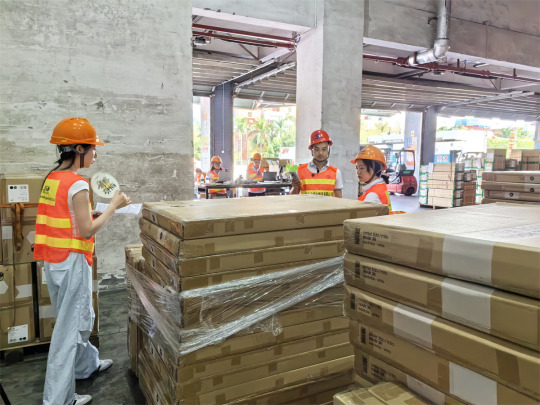
Even if their quotes were low, Mr. Gu still wasn't assured if he handed the job over to them. So, he had to find a reliable freight forwarder China to Saudi Arabia. When Mr. Gu inquired about our company's situation, I told him that we were a large-scale freight forwarder company that had purchased an entire floor of 1,800 square meters of Grade A office space in Block B of Rongde Times Square, with nearly a hundred employees. How many of our peers can compare with us? We also have a dedicated foreign trade warehouse in Yantian Port, one of only three among 60,000 peers in Shenzhen.
I told Mr. Gu that we had handled similar cases like helping Huawei ship over six million dollars worth of electronic products to South America. Due to the international situation at that time, we didn't dare to take the regular Miami route. Our team worked tirelessly for many days and nights, collaborating with European agents to develop a new route. The goods departed from Shenzhen and successfully arrived at their South American destination via Europe. This was not only a successful delivery of this order but also a groundbreaking achievement in opening up another perfect transit route from China to South America.
Mr. Gu sent someone to visit and inspect our company. I took him on a tour and told him that we were founded in 1998 and have been operating for 26 years now. In fact, for freight forwarder companies, only by working hard, not taking shortcuts, and developing step by step can they grow to such a large scale. Mr. Gu was convinced and said that we were a reliable freight forwarder China to Saudi Arabia, and he didn't worry about anything going wrong if he handed the goods over to us.
There's also Mr. Yue from the Fuzhou Machinery Factory, who has two factories in Saudi Arabia and often ships equipment or raw materials from China to the NEOM Port in Saudi Arabia. He has high requirements for the freight forwarder China to Saudi Arabia that serves him because his equipment is all high in value. In the past, there were cases of improper loading inside the containers, leading to shifting and damage during transportation. This was caused by the loading workers not balancing the weights properly or securing the items firmly, among other reasons. It could be due to the workers not paying attention, being inexperienced newcomers, or even the inexperienced personnel in charge at the freight forwarder company. We can't monitor all these links, and the only effective way is to find an experienced and professional freight forwarder China to Saudi Arabia. High management standards can prevent these unexpected accidents from happening.
This time, he had two more containers of equipment to ship and came to me. At first, we were at an impasse due to pricing issues. Mr. Yue was probably testing us, and he responded with a relatively low price, which led to a stalemate. In fact, he wanted to visit our company before making a decision. Mr. Yue told me he wanted to visit our company, and he was quite smart about it, not specifying which day he would come.
I didn't think much of it. A few days later, at 2 PM, Mr. Yue suddenly appeared at our company's doorstep. It was like a surprise inspection by a client! After visiting our company, I told Mr. Yue that we have our own booking, trucks, container trailers, and warehousing. Our business scope includes consolidated shipments, collection and transportation, customs clearance, insurance, settlement, and other integrated services. After 26 years of development, we have become one of the few freight forwarders China to Saudi Arabia. We are a non-vessel operating common carrier (NV007258) approved by the Ministry of Transport of China, a senior member of the World Cargo Transportation Alliance (WCA, 87909), and have joined logistics associations such as WIFFA and JCTRANS since 2006. It's not an exaggeration to say that there's hardly a second one like us in China.
Mr. Yue witnessed the strength of our freight forwarder China to Saudi Arabia with his own eyes. What's important is that the services we provide are just what he needs, so he didn't negotiate with us on price anymore and signed the contract directly.
If you're like Mr. Gu and Mr. Yue, needing logistics services from China to Saudi Arabia or for other destinations, I'll be your reliable logistics partner. To get to know me better, read my diary, which records more about my 26 years of experience as a freight forwarder China to Saudi Arabia and the heartwarming stories between us and our clients. Feel free to contact me anytime if you have any needs.
freight forwarder china
freight forwarder China to Saudi Arabia
shipping from China to Jamaica
freight forwarder China to Mexico
0 notes
Text
WND: ‘Food security is national security,’ but America is losing that war
COGwriter
World New Daily reported the following:
‘Food security is national security,’ but America is losing that war
August 10, 2024
The United States government and the Chinese Communist Party see “national security” in two very different ways – and that includes food security.
Historically, the CCP has been known to weaponize its food supply, which it has done against millions of its own citizens, resulting in mass starvation and suffering. But today, it appears the communist government is stockpiling food, indeed, making it a major national security priority for its people. Why?
Tommy Waller, president and CEO of the Washington, D.C.-based think tank the Center for Security Policy, says most Americans do not understand that “food security is national security”. And that currently, the safety of American citizens is, indeed, being jeopardized by the U.S. government. The retired Marine Corps lieutenant colonel, in an interview with WND, explained that “at the federal level, our nation has catastrophically failed to prioritize food security while all of our adversaries, both hostile nations and globalists, have had their crosshairs on food for quite a while.”
For example, Waller said, in stark contrast to “having no problem starving its own people,” the Chinese government has an entire agency called the National Food and Strategic Reserves Administration. It is largely responsible for laws and regulations that oversee grain and material reserves of the East Asian country.
In statistics often touted by members of the Chinese regime, Waller said, “China’s grain inventories are so abundant that the stock-to-use ratio is well above the international grain security threshold.”
“The U. S. government has not put a major priority on food security or preparedness,” Waller warned. In contrast to the Chinese regime’s prioritizing strategic reserves of food, he told WND, “under the Biden administration, the USDA and FEMA have transitioned from a culture of preparedness to priorities of diversity, equity and inclusion – DEI – and climate change.”
What’s more, he said, the Biden administration has incentivized many farmers to reprioritize the use of their land away from cultivating it for food production. https://www.wnd.com/2024/08/food-security-is-national-security-but-america-is-losing-that-war/
As far as China’s food preparations go, notice the following:
China’s continued construction of grain warehouses, including green facilities, brought the national grain storage capacity to over 700 million metric tons by the end of 2023, an increase of 36 percent from 2014, according to an official of the National Food and Strategic Reserves Administration.
Since the start of the 14th Five-Year Plan period (2021-2025), China has built and upgraded grain storage facilities with a total capacity in excess of 65 million tons. Key performance indicators such as airtightness and thermal insulation levels have significantly improved, said Zhou Guanhua, director of the administration’s safe storage and technology department, as quoted in a report published by Science and Technology Daily on Friday.
In recent years, China has established a comprehensive grain storage system that is compatible with grain production, reserves and distribution, Zhou said, adding that China’s grain storage facilities have met the country’s grain purchase and storage needs in terms of overall capacity. http://www.ecns.cn/news/society/2024-06-02/detail-iheawhsx5144466.shtml
With China, such preparations are not new. A while back, Michael Snyder posted the following:
China Is Feverishly Preparing For The Coming Global Famine, But The U.S. Is Taking A Completely Different Approach
December 28, 2021
We live at a time when global food supplies are getting tighter and tighter and global food prices just keep going higher and higher. Bizarre weather patterns and widespread natural disasters have been playing havoc with food production all over the planet, and the COVID pandemic has thrown worldwide supply chains into a state of complete and utter chaos. As a result, the world is “currently battling the worst hunger crisis this century”, and it is expected to get even worse in 2022. …
Apparently, the Chinese government can also see what is coming, because right now they are hoarding food on an unprecedented scale…
Less than 20% of the world’s population has managed to stockpile more than half of the globe’s maize and other grains, leading to steep price increases across the planet and dropping more countries into famine.
The hoarding is taking place in China.
If everything is going to be just fine, why would China be doing this?
It simply would not make sense.
But if famine is on the way, the Chinese are being extremely prudent. And the amount of food that they are now stockpiling is definitely eye-popping…
According to data from the U.S. Department of Agriculture, China is expected to have 69% of the globe’s maize reserves in the first half of crop year 2022, 60% of its rice and 51% of its wheat.
If things hit the fan in 2022 or beyond, Chinese officials have ensured that their people are going to be able to eat. …
So what is the U.S. doing?
Surely we must be stockpiling lots of food too, right?
Sadly, we aren’t.
There were times in the past when the U.S. government stockpiled large amounts of food, but those programs have mostly been eliminated…
The government has in the past stockpiled food, but these programs were mainly to support farmers hurt by low prices. For example, in the late 1970s and early 1980s, the Department of Agriculture (USDA) bought surplus dairy products, which it distributed to Americans via various welfare programs.
At this point, the U.S. government does not anticipate that there will be a need to supply food to the entire country. …
In the event of a major national emergency, the very limited amount of food that the U.S. government has on hand will be gone almost immediately.
Once it is gone, you will be on your own.
I would suggest that you prepare accordingly. http://theeconomiccollapseblog.com/china-is-feverishly-preparing-for-the-coming-global-famine-but-the-u-s-is-taking-a-completely-different-approach/
As far as physical preparations go, the Bible teaches:
6 Go to the ant, you sluggard! Consider her ways and be wise, 7 Which, having no captain, Overseer or ruler, 8 Provides her supplies in the summer, And gathers her food in the harvest. 9 How long will you slumber, O sluggard? When will you rise from your sleep? 10 A little sleep, a little slumber, A little folding of the hands to sleep — 11 So shall your poverty come on you like a prowler, And your need like an armed man. (Proverbs 6:6-11).
15 “Laziness casts one into a deep sleep, And an idle person will suffer hunger” (Proverbs 19:15).
4 The lazy man will not plow because of winter; He will beg during harvest and have nothing. (Proverbs 20:4)
24 … they are exceedingly wise: 25 The ants are a people not strong, Yet they prepare their food in the summer; (Proverbs 30:24-25)
But won’t God provide?
3 “The LORD will not allow the righteous soul to famish” (Proverbs 10:3).
Yes, He will, but look at the next verses:
4 He who has a slack hand becomes poor, But the hand of the diligent makes rich. 5 He who gathers in the summer is a wise son; He who sleeps in harvest is a son of shame” (Proverbs 10:4-5).
So, the Bible speaks well of those who gather in the seasons when they can.
Notice also something from the New Testament:
10 For even when we were with you, we commanded you this: If anyone will not work, neither shall he eat. 11 For we hear that there are some who walk among you in a disorderly manner, not working at all, but are busybodies. 12 Now those who are such we command and exhort through our Lord Jesus Christ that they work in quietness and eat their own bread. (2 Thessalonians 3:10-12)
You are not just to sit around and expect others to take care of you. Watch also: Physical preparedness for Christians.
Let me add that Norway is also stockpiling some food (see ‘Norway to stockpile 82,500 tons of grain to prepare for famine and war’ & ‘If The High Cost Of Groceries Makes You Feel Sick, You Are Not Alone’).
For those Americans who think, “It can’t happen here” related to food shortages, notice a photo that my wife Joyce took towards the beginning of the COVID pandemic:
Jesus prophesied famines (Matthew 24:4-8) as part of the beginning of sorrows. Though the Chinese government does not accept the Bible, it is taking steps that the USA is not.
The old Worldwide Church of God published the following:
The black horseman’s future ride will reduce the proud faces of white America, Europe, and the British Common wealth into the blackened skin of starvation such as now afflicts the vast majority of mankind. (Alexander G. The Four Horsemen of the Apocalypse. Ambassador College Press, Pasadena (CA), 1973, p. 31)
Notice some of the penalties for disobedience recorded in the 26th chapter of Leviticus: “If after all this you have not learnt discipline but still defy me, I in turn will defy you and scourge you seven times over for your sins. I will bring war in vengeance upon you … you shall be herded into your cities, I will send pestilence among you, and you shall be given over to the enemy. I will cut short your daily bread until ten women can bake your bread in a single oven; they shall dole it out by weight [see Revelation 6:5-6], and though you eat, you shall not be satisfied. If in spite of this you do not listen to me and still defy me, I will defy you in anger, and I myself will punish you seven times over for your sins. Instead of meat you shall eat your sons and daughters” (Lev. 26:23-28, The New English Bible). Other passages warn of famine-producing upsets in weather (Amos 4:7, Deut. 28:24); ruined harvests (Ezek. 5:16, Deut. 28:17); blighted crops (Amos 4:9); harmful insect pests (Deut. 28:39, 42); and nonproductive soil (Deut. 28:23). (4 Horsemen of the Apocalypse – The Black Horse – Famine. WCG booklet, 1976)
Food inflation is also something predicted in Revelation 6:5-6 (see also Four Horsemen of the Apocalypse). Related to food inflation, the Continuing Church of God (CCOG) put out the following video on our Bible News Prophecy YouTube channel:
youtube
12:03
Food Inflation & the 3rd Horseman of the Apocalypse
The Wall Street Journal, Reuters, UN’s FAO, and others are reporting food price inflation as well as often selected shortages of some food items. Might it get worse? Did Jesus prophesy famines? One analyst stated, “WE haven’t seen anything yet” in regards to rising food prices. Should Christians prepare? What about helping others? Does the ride of the third horseman of the Apocalypse (Revelation 6:5-6) point to a coming time of severe food inflation. Is more food price inflation coming? Dr. Thiel addresses these issues and more in this video.
Here is a link to the video: Food Inflation & the 3rd Horseman of the Apocalypse.
We put together the following video on our Bible News Prophecy YouTube channel:
youtube
14:44
3rd Horseman of the Apocalypse and Food
There are reports about food price inflation around the world. While it is worsening in many areas, some believe it will improve in 2023. Instead, could prices continue to rise in 2023 and get much worse in 2024 and thereafter? What are the causes of food price inflation? Is there any connection between weather, government policies, fertilizer prices, energy costs, economic sanctions and food price inflation? What are we seeing in reports from the United Kingdom, Hungary, and South Africa? What about impacts from Russia’s ‘special military operation’ into Ukraine? Could EU and/or USA policies be effecting any of this? Is the ‘black horse’ the one associated with famine, food shortages, and food price inflation in the Book of Revelation? Are there any physical lessons we can learn from ants according to the Book of Proverbs? What are some spiritual steps we should take according to Jesus? Dr. Thiel and Steve Dupuie address these matters and more.
Here is a link to our video: 3rd Horseman of the Apocalypse and Food.
Now, let’s look at some of what that portion of the Bible says in Amos 4:
7 “I also withheld rain from you, When there were still three months to the harvest. I made it rain on one city, I withheld rain from another city. One part was rained upon, And where it did not rain the part withered. 8 So two or three cities wandered to another city to drink water, But they were not satisfied; Yet you have not returned to Me,” Says the Lord.
9 “I blasted you with blight and mildew. When your gardens increased, Your vineyards, Your fig trees, And your olive trees, The locust devoured them; Yet you have not returned to Me,” Says the Lord.
10 “I sent among you a plague after the manner of Egypt; Your young men I killed with a sword, Along with your captive horses; I made the stench of your camps come up into your nostrils; Yet you have not returned to Me,” Says the Lord.
11 “I overthrew some of you, As God overthrew Sodom and Gomorrah, And you were like a firebrand plucked from the burning; Yet you have not returned to Me,” Says the Lord.
12 “Therefore thus will I do to you, O Israel; Because I will do this to you, Prepare to meet your God, O Israel!” (Amos 4:7-12)
The USA and some other countries are promoting sins like Sodom and Gomorrah.
Food shortages are coming.
Jesus predicted them.
Expect food inflation. And yes, there will be famines as well–the USA is NOT exempt!
Related Items:
Physical Preparation Scriptures for Christians. We all know the Bible prophecies famines. Should we do something? Here is a version in the Spanish language Escrituras sobre Preparación física para los Cristianos. Here is a link to a related sermon: Physical preparedness for Christians.
Four Horsemen of the Apocalypse What do each of the four horseman of the Apocalypse represent? Have they began their ride? Did Jesus discuss the any of this? Might their rides coincide with the “beginning of sorrows? Do they start their ride prior to the Great Tribulation? Did Nostradamus or any other ‘private prophets’ write predictions that may mislead people so that they may not understand the truth of one or more of the four horseman? There is also a related YouTube video titled Sorrows and the Four Horsemen of the Apocalypse.
Lost Tribes and Prophecies: What will happen to Australia, the British Isles, Canada, Europe, New Zealand and the United States of America? Where did those people come from? Can you totally rely on DNA? Do you really know what will happen to Europe and the English-speaking peoples? What about the peoples of Africa, Asia, South America, and the islands? This free online book provides scriptural, scientific, historical references, and commentary to address those matters. Here are links to related sermons: Lost tribes, the Bible, and DNA; Lost tribes, prophecies, and identifications; 11 Tribes, 144,000, and Multitudes; Israel, Jeremiah, Tea Tephi, and British Royalty; Gentile European Beast; Royal Succession, Samaria, and Prophecies; Asia, Islands, Latin America, Africa, and Armageddon; When Will the End of the Age Come?; Rise of the Prophesied King of the North; Christian Persecution from the Beast; WWIII and the Coming New World Order; and Woes, WWIV, and the Good News of the Kingdom of God.
LATEST NEWS REPORTS
LATEST BIBLE PROPHECY INTERVIEWS
0 notes
Text
i decided to pay for linkedin premium since i thought it would help my chances of getting a job but it's really not helping. i keep seeing different posts from people, not just on linkedin but pretty much every social platform talking about how hard it is to find a job. and the amount of times i've gone out for food and the person before me is asking if they are hiring.
i'm still watching the bear season 3 but napkins... i cried. tina's struggle was so real and i was sobbing. and the coldness you encounter during the entire experience. it's so rare to feel like you are getting anywhere.
i've generally just been depressed about the world.
america and it's government for one. it's hard to watch. i think it's even harder to watch the vote blue no matter who crowd. i used to be a staunch believer in being an active participant in voting but ever since i saw that comment that was like "they encourage you to go through their systems for change so that you are stopped in the system" (not exactly but you get the gist) made me rethink it. why bother voting for the change we need when no one is bringing it to the table? it's hard to watch someone BEG for "vote blue!! vote BLUE!!" when active genocide and disenfranchisement has been happening under blue. like.. on god... are you dumb? blue or red you are FUCKED.
i love taking the opportunity to criticize the american government so it's hard to listen to people reinforce the system. voting isn't even equal!!!!! should've been your first clue that it's all fucked up!!!
maybe controversial, but we should start killing people. i wish death upon my premier. may his dumbass choke and fall down several flights of stairs.
i'm so serious tho. it's liberal brain rot to think we can hold hands and peacefully reach a "proper solution" to any issue. we need to start throwing bricks
OMG and the supreme court!!! kill them fuckers too!! everyone is so old and lame, i'm convinced if a firework blew up next to them they would go into cardiac arrest. honestly that goes for all of them, presidential candidates, government employees. all old asses need to GO. yes i am being ageist on this one. no i do not care, get them to do a cognitive function test before they get to work.
i hate it in canada too. and it's so fucked bc the problems just keep compounding and no politician is for the people. pretty much every politician is either a landlord or related to a developer so the housing crisis will never get fixed. and every monopoly insists of making life unbearable here. why was my phone bill $63? because they can. groceries? so expensive. and public transit is dogshit. and they are taking away culture centres too.
i expressed wanting to move away. my shortlist is spain, portugal, the netherlands or brazil
brazil seems to be controversial anytime i talk about it but it feels like people don't think south americans are people sometimes. "so much crime, corruption, it's dangerous, you can't trust".... i have to wait 3 years for 750m of road to be repaired. cops are always just lounging at construction sites. there are way too many charities and foundations set up by billionaires for tax write offs. assaults on transit are so much more frequent. healthcare is getting less and less funding people need to pay for services. kids are stupid as hell because education is also underfunded. mass immigration is burdening social services because we don't have enough resources to accommodate these people AND immigrants who are mostly international students are being targeted by universities and colleges so they can charge ridiculous tuition and leave them with no support. so as if it's really any better here.
and yet, when i talk about wanting to leave, everyone has an opinion. "oh it's not really that great there, it's over hyped" "it's still expensive to live there" "you won't have anyone" pls. i barely have anyone HERE.
i don't feel supported on decisions i want to make for myself. they are selfish wants so yeah i get it, but i don't care. i want it for me!!!! i am miserable!!! my mental health is in the gutter and the more time i'm subjected to living at home, the worse it gets. i'm drowning and people keep high fiving me instead of throwing a life support.
and more than anything, the lack of support makes me doubt my ability to do anything. maybe i'm not capable of finding a better job? maybe i'm not even deserving of better? is this just my burden to bare? will i never escape?
it makes me wish i was dead instead. rather be dead than live through all this. not even a glimmer of hope. there is not light at the end of the tunnel. i rather be dead than have to live all these years just for the pay off to come when i'm 50 or something. that's 20 more years of pain? no thanks.
all this to say, i know im not alone on this. many people are in my scenario. they are probably handling it better than i am. i'm not good at this - i'm not patient, and clearly not optimistic. i feel like i'm reaching the end of my rope.
0 notes
Text
“If you wonder why I—a woman of color, an African, a former Muslim, a former asylum seeker, and an immigrant—look at the antics of today’s anti-Israel, anti-American protesters with such fear and trembling, allow me to explain.
I was born in Somalia in 1969. The country had achieved independence nine years before. But less than a month before I was born—on October 21, 1969—a junior member of the brand-new Somali armed forces seized power with the help of the Soviet Union. The first two decades of my life were shaped by the upheaval that followed that coup.
(…)
For me it is all captured in the earliest memories of my youth: statues of Mohamed Siad Barre, our dictator, sprung up across Mogadishu, flanked by a trio of dark seraphim: Marx, Lenin, and Engels. This particular communist experiment plunged Somalia into bloodshed, mass starvation, and a 20-year period of suffocating tyranny. I recall my grandmother and mother smuggling food into our house. I also remember the whispering: we felt the state was omnipresent. It could hear everything.
My father was thrown into prison. His friends—those other pioneers in pursuit of a democracy modeled on America—were either jailed like him or, in many cases, executed.
By the time I was eight, my family knew we needed to escape. We left in 1977. By 1990, the country had descended into a civil war from which it has never fully recovered.
I never stopped longing for the kind of freedom my father had taught me about. And at the age of 22, I fled to the Netherlands seeking it. There—and later, in America—I discovered what we’ve come to call “Western” values.
The West’s inheritance springs from a peculiar confluence of habits and customs that had been practiced for centuries before anyone branded them as “ideas.” But they are principles—radical ones—that have given us the most tolerant, free, and flourishing societies in all of human history.
Among these principles are the rule of law, a tradition of liberty, personal responsibility, a system of representative government, a toleration of difference, and a commitment to pluralism. Each of these ideas might have been extinguished in their infancy but for the grace of God and the force of their appeal.
(…)
Right now, so many Western nations are under grave threat from the twin forces of cultural Marxism and an expansionist political Islam familiar to me from my youth.
For a time, many refused to believe that anything was actually wrong. The tide of populism was, they insisted, a momentary manifestation of frustration. The decline of each of our institutions was viewed in isolation, as a problem of poorly selected leadership, which could be corrected after the next election or with a changing of the guard. The sense of hopelessness that people felt was explained away as the temporary consequence of the rapid transition away from industrialism and the ushering in of the digital age.
(…)
When the omni-breakdown burst forth in 2020 with the crises the Covid-19 pandemic and the draconian controls that governments imposed, and the George Floyd riots, most of us awoke from our slumbers and behaved like the blind men, ping-ponging around theories with the tremulous (sometimes furious) chatter that heralds the turning of an age.
As one of those blind men—and surely I, too, am encountering only part of the elephant—my perception is that we are a society subverted. By this, I do not mean that we are subverted in the sense that a few spies and saboteurs are conducting covert operations, blowing up a bridge or an airfield. I mean we are subverted in a more systematic and totalizing way.
(…)
Living in the West in 1983, Bezmenov gave a lecture in which he explained “Psychological Warfare, Subversion, and the Control of Society.” It begins:
Subversion refers to a process by which the values and principles of an established system are contradicted or reversed in an attempt to sabotage the existing social order and its structures of power, authority, tradition, hierarchy, and social norms. It involves a systematic attempt to overthrow or undermine a government or political system, often carried out by persons working secretly from within. Subversion is used as a tool to achieve political goals because it generally carries less risk, cost, and difficulty as opposed to open belligerency. The act of subversion can lead to the destruction or damage of an established system or government. In the context of ideological subversion, subversion aims to gradually change the perception and values of a society, ultimately leading to the undermining of its existing systems and beliefs.
(…)
When, on October 8, protests erupted across the Western world in support of Hamas—and not the democracy that had been overrun by terrorists—I saw the revolution. When I look at the recent spectacle at Columbia or Yale or UCLA or Harvard or Stanford—students tearing down American flags and raising Palestinian ones; or chanting in Arabic “from the river to the sea, Palestine will be free”—it is hard not to see the fruit of this long process. I hear the same when, week after week, the streets of London, Amsterdam, Brussels, and Hamburg ring with cries of “intifada” or open demands for a caliphate or Sharia law in the heart of Europe.
How did it happen?
Bezmenov described the subversion process as a complex model with four successive stages, a diagram of which I have provided. These are, in order: demoralization, destabilization, crisis, and finally, normalization.
Demoralization is the first stage and requires the subverters’ greatest investment of time and resources. Bezmenov claims the process of demoralization can take between 10 to 30 years, because that is the amount of time it takes to educate a new generation.
The demoralization process targets three areas of society: its ideas, its structures, and its social institutions. The targeted institutions include religion, education, media, and culture. In each realm the old ways of thinking, the old heroes, are discredited. Those who believed in them come to doubt themselves and their ability to discern reality itself.
(…)
The ultimate intended outcome is that the afflicted willingly embrace self-destructive behaviors and ideas. Thus, all moral constraints can be eschewed in the pursuit of “just” and “virtuous” causes.
(…)
Next, the fundamental structures of society—like the rule of law and social relations—are targeted. For example, demoralization in the rule of law would entail undermining our trust in legal institutions and eroding the basis for legal authority. This could be accomplished by presenting the justice system as corrupt or illegitimate and by sowing distrust in the mechanisms of law enforcement. Think of the movements to “defund the police” because of “systemic racism.” Or the conviction last week of the front-runner presidential candidate on 34 counts of obvious political charges.
As a consequence, citizens lose confidence in the administration of justice, paving the way for untold social disorders, including legal nihilism, where people disregard the law en masse.
(…)
The third area—which Bezmenov called “life”—includes core social institutions such as family, health, race, population, and labor. Demoralization of the family is probably a familiar concept to us all. It involves promoting ideas that weaken the bonds between members of the family, promoting narcissistic individualism over family unity, creating financial stressors that discourage family formation, acrimony between the sexes, and the replacement of parental authority with the state.
Thus, the retrograde practice of polygamy is rebranded as polyamory. The natural human urge to create and nurture new human life is treated derisively by “DINKS” with slightly more latte money, or, more seriously, as an irresponsible and selfish choice to make because of climate change. Meantime, parents are told at every turn that they don’t know what they’re doing—and to defer to the experts instead.
The result is that not only do individuals feel less attachment to family, the fundamental unit of a healthy civilization, but they even end up detached from society itself. As we now know, the breakdown of family is strongly correlated with the epidemic of mental health crisis and explosive rise in violent crime: 85 percent of American youth in prison come from fatherless homes.
The goal of demoralization is to gradually degrade the foundations of a healthy society across all domains by erasing moral lines and exploiting preexisting discontents. What a society used to call abnormal and pathological, subversion normalizes. Just consider, for example, our culture’s attitude toward pedophiles, now rebranded as “minor-attracted persons.” By hijacking the legacy and language of the civil rights movement, nearly any “marginalized” group has a vehicle to try to “mainstream” deviant behavior. Consider the fact that across civilized societies it is not just “wrong” to say that a man cannot become a woman. It is thought to be cruel. So cruel that the Scots have made it illegal.
(…)
Even in the cases where subversive activity is clearly illegal, such as with destruction and violence during the 2020 riots and at many anti-Israel protests today, crimes committed in service of some larger goal—like “decolonization”—are presented as righteous. Decolonization is a word that’s become as common these days as social justice. But what does it mean? Gal Beckerman of The Atlantic has written about the Marxist origins of this concept and one of its chief proponents, Frantz Fanon. Fanon, Beckerman writes, is “the patron saint of political violence,” and his “concepts have provided intellectual ballast and moral justification for actions that most people would simply describe as terror.” Listen to Fanon himself: “whatever may be the headings used or the new formulas introduced, decolonization is always a violent phenomenon.”
When young people say “resistance is justified,” many—if not most—of them believe they are simply standing up for the downtrodden. But the deeper implications of that statement are about justifying the morally reprehensible. How else to explain that at our most prestigious college campuses, students can be found glorifying Hamas terrorists and openly praising North Korea?
(…)
We have also come to a place where it is difficult for anyone to dissent for fear of incurring the wrath of the adherents—witting or not—of subversion. So people go along, keep their heads down, and try not to make a fuss.
Destabilization is the next phase. This process is considerably shorter, taking anywhere between five months to two years. With demoralization now reaching its full maturity, society is increasingly paralyzed by harsh domestic turmoil across all sectors. Democratic politics take on the character of a vicious struggle for power. Factionalism takes hold. Economic relations degrade and collapse, obliterating the basis for bargaining. The social fabric frays, leading to mob rule. Society turns inward, leading to fear, isolationism, and the decline of the nation-state itself, leading to crisis.
It is important to understand that, at this stage, the process of subversion is largely self-propelled. What once required active involvement on the part of a subverter has now taken root and grows organically. Then, society ruptures all at once in a rolling series of crises as the full extent of the cancer manifests.
Finally, says Bezmenov, a subverted society enters the normalization stage, which is when the subversive regime takes over, installing its ideology as the law of the land. By then, the enemy has totally conquered the target society—without ever firing a shot.
(…)
The question, of course, is who is doing the subverting. Who is trying to unravel America and the West?
The first: American Marxists. This category includes old card-carrying communists, red-diaper baby socialists, antifa anarchists, and many of whom we now call woke. Though the Soviet Union collapsed decades ago, the Soviet worldview has found familiar proponents: young Americans and their professors. They are no longer advancing their cause merely through class struggle, but through the fusion of racial, class, and anticolonial struggles. Theirs is now a cultural communism; they lead subversion through the institutions with the ultimate aim of overthrowing the West.
(…)
The second force is the radical Islamists, who are riding the coattails of the communists to power. A good example is the Muslim Brotherhood and its many tentacles. Of these tentacles, some are openly religious, like the Council on American-Islamic Relations and the Muslim Students Association, each with chapters in nearly every American university. Other organizations don a secular mask, like the so-called Students for Justice in Palestine. These groups have become increasingly confident over the past months. Anti-Israel Muslim candidates recently won elected seats in countries like England, where imams talk openly about reestablishing the caliphate in Europe.
The third force is the Chinese Communist Party. The most obvious avenues through which the CCP has spread subversion in America is through its numerous Confucius Institutes. These organizations have been vehicles for Chinese espionage within major American academic institutions. Then there is TikTok, an addictive social media app controlled by the CCP, which presents Chinese children wholesome, educational content while wreaking havoc on American kids—polarizing them and feeding them anti-American propaganda.
(…)
The widespread acquisition of useless, aggressively ideological degrees in gender and race, or the claims of the possibility of an unlimited number of genders, or the total racialization and “decolonization” of our political discourse, or the demands to defund the police, the toppling of statues, the defacing of art, the “spontaneous” protests to dismantle our structures, and much else, I now understand as acts of subversion rather than mere expressions of discontent or youthful energy run amok.
(…)
Orwell said that “To see what is in front of one’s nose needs a constant struggle.” Everyone with eyes to see is now scrambling to do just that.
What is at stake in our ability to see plainly? Everything. What is at stake is nothing less than the preservation of our way of life.
Now is the time for all of us blind seekers to come together. To restore what we have lost will be the work of our lifetimes. Can there be a more important project?”
1 note
·
View note
Text
San Diego Unified

Wheels on San Diego Unified's new buses will use electricity to go round and round
The San Diego Unified School District is among several across the state set to benefit from a federal grants program to invest in electrical school buses, the U.S. Environmental Protection Agency announced Monday.
The EPA announced the selection of 67 applicants throughout the country to receive nearly $1 billion through its Clean School Bus Program Grants Competition. In total, California was awarded $88 million that will support SD Unified, Kern High School District, Porterville Unified School District and Los Angeles Unified School District.
The program is intended to help grantees purchase more than 2,700 clean school buses in 280 school districts, serving over 7 million students across 37 states.
"Every school day, 25 million children ride our nation's largest form of mass transit: the school bus. The vast majority of those buses run on diesel, exposing students, teachers, and bus drivers to toxic air pollution," Vice President Kamala Harris said in a statement.
She added, "As part of our work to tackle the climate crisis, the historic funding we are announcing today is an investment in our children, their health, and their education."
Additionally, the program is intended to strengthen the economy by investing in American manufacturing and workforce.
The Clean School Bus Program — created through the Bipartisan Infrastructure Law and modeled after the Clean Commute for Kids Act that Sen. Alex Padilla, D-California, introduced in 2021 — is expected to provide $5 billion over five years to support the transition to zero-emission and low- emission school buses.
Over 400,000 public school buses travel more than 4.3 billion miles each year to help 23.5 million children get to and from school, according to the U.S. Department of Transportation's National Highway Traffic Safety Administration.
"A successful day of learning for our students starts with a diesel-free commute each morning," Padilla said in a statement. "I've seen firsthand the harmful health and respiratory impacts polluted air from outdated buses can cause our children, having grown up riding diesel-powered school buses in Pacoima."
"Modernizing our bus system is a crucial investment in our children, our health and our environment. That is why I championed the inclusion of the Clean School Bus Program in the Bipartisan Infrastructure Law, which is now helping California schools make the much-needed transition to electric bus fleets," he added.
According to Padilla's office, through the funding, SDUSD is expected to acquire 30 electrical buses; Los Angeles Unified to acquire 50; Kern High School District is expected to acquire 39 buses; and Porterville Unified is expected to purchase 35 buses.
Prioritized school districts in low-income, rural, and/or tribal communities make up approximately 86% of the projects selected for funding, according to the EPA.
"Today we're once again accelerating the transition to electric and low-emission school buses in America, helping to secure a healthier future where all our children can breathe cleaner air," EPA Administrator Michael S. Regan said in a statement.
Grantees will work with their EPA Regional Project Officers to finalize project plans and purchase their awarded new buses and eligible infrastructure. EPA is also partnering with the Joint Office of Energy and Transportation to provide grantees with robust technical assistance to ensure effective implementation. EPA is currently accepting applications for the 2023 Clean School Bus Rebate Program until Jan. 31. EPA encourages applicants not selected for the 2023 Clean School Bus Grant Program — and those that did not apply — to participate in current and future funding rounds. *Reposted article from NBC 7 by City News Service on January 8, 2024
0 notes
Text
Automotive: Stellantis and Orano join forces in battery recycling

The car manufacturer and the nuclear specialist will create a joint venture aimed at recovering waste from used vehicle batteries and gigafactories.
Orano takes another step towards the automotive sector. This Tuesday, the nuclear specialist announced an agreement with Stellantis[1] “aimed at creating a joint venture specializing in the recycling of end-of-life vehicle batteries and production waste from gigafactories” in Europe and North America.
This new entity must rely on an “innovative low-carbon process” developed by Orano[2], “enabling on the one hand the recovery of all the components of lithium-ion batteries and on the other hand the manufacture of new materials for the cathodes”. It will also make it possible to produce “black mass”, a powder of lithium, cobalt and nickel.[3]
Production launched in early 2026
The elements thus upgraded should enable Stellantis “to consolidate its position in the battery value chain by securing additional supply […] necessary for the electrification of the sector and the energy transition”. The manufacturer also ensures that it complies with the European Union's 2031 batteries’ directive, which provides for the use of recycled materials, in a circular economy approach.
“We are delighted with this partnership concluded with a major player such as Stellantis and to be able to work together on the recycling of used electric batteries,” said Guillaume Dureau, director in particular responsible for Innovation, R&D and batteries at Orano. Production is scheduled to start in early 2026 and will reuse the automaker’s “existing infrastructure and resources.”
This agreement is not Orano's first foray into electric battery recycling[4]. In May, the group announced an agreement to create two joint ventures in Dunkirk with the Chinese company XTC[5], specializing in the production of materials for batteries. Formalized by French president Emmanuel Macron during a trip to the North, of the country this project is estimated at 1.5 billion euros and should create around 1,700 jobs.
Source
AFP, Automobile : Stellantis et Orano s'allient dans le recyclage des batteries, in : Les Echos, 24-10-2023 https://www.lesechos.fr/industrie-services/automobile/automobile-stellantis-et-orano-sallient-dans-le-recyclage-des-batteries-1992032
[1] Stellantis N.V. is a multinational automotive manufacturing corporation formed from the merger of the Italian–American conglomerate Fiat Chrysler Automobiles (FCA) and the French PSA Group. The company is headquartered in Amsterdam. As of 2022, Stellantis is the fourth largest automaker by sales behind Toyota, Volkswagen Group, and Hyundai Motor Group. Stellantis designs, manufactures, and sells automobiles bearing its 16 brands: Abarth, Alfa Romeo, Chrysler, Citroën, Dodge, DS, Fiat, Fiat Professional, Jeep, Lancia, Maserati, Mopar, Opel, Peugeot, Ram, and Vauxhall. At the time of the merger, Stellantis had approximately 300,000 employees, a sales presence in more than 130 countries, and manufacturing facilities in 30 countries.
[2] Ever since its beginnings in the 1950s and 1960s, the nuclear industry has had to ponder the question of used fuel management. With the creation of the la Hague treatment plant in 1966, the French nuclear industry acquired a sustainable solution for meeting this need. The la Hague site has evolved over the years and is now – as it has always been – the global benchmark in the field of treatment, a vital step in recycling. Orano la Hague, a major player in used nuclear fuel recycling. the Orano la Hague site is located some 25 kilometres from Cherbourg in the Manche Department in France. https://www.orano.group/country/china/en/our-stories/orano-la-hague
[3] Read also: https://www.tumblr.com/earaercircular/690217753279397888/japanese-start-up-can-recycle-cobalt-and-nickel?source=share&ref=_tumblr
[4] Read also: https://www.tumblr.com/earaercircular/682712149928394752/umicore-becomes-major-supplier-for-electric?source=share&ref=_tumblr
[5] XTC New Energy Materials Xiamen Co Ltd is a China-based company principally engaged in the research and development, production and sales of cathode materials for lithium-ion batteries. The Company's main products are lithium cobalt oxide and Nickel-Cobalt-Manganese (NCM) ternary materials. Its lithium cobalt oxide covers 4.35V, 4.4V and 4.45V models. Its lithium cobalt oxide is mainly used in electronic products such as smart phones, notebook computers, tablet computers, drones, e-cigarettes, and wearable devices. Its NCM ternary materials cover Ni5, Ni6, Ni7 and Ni8 models. Its NCM ternary materials are used in electric vehicle, electric bicycle and consumer electronics fields. https://www.marketscreener.com/quote/stock/XTC-NEW-ENERGY-MATERIALS--126415552/company/#:~:text=XTC%20New%20Energy%20Materials%20Xiamen,materials%20for%20lithium%2Dion%20batteries.
0 notes
Text
There is honestly a lot of racism behind the opposition to bus improvements! When you dig into it you get a lot of people who refuse to even countenance it because it's "for those people".
This has a particular history behind it too: a lot of people associate rail transit with a lost golden age sort of thing. Which has a lot of imagery of frankly much more heavily white cities. You get the stupid narratives that "things were great when we had streetcars and then they all got removed for cars". And that just didn't happen.
Because what replaced them was busses, and those are often running on the same routes to this day as the trolley they replaced. With similar levels of service to what those dying private transit companies were running when they switched to busses...for the very same reason busses are used today! Less infrastructure, flexible rerouting, all of that.
But this was also occurring in the midst of mass movement to cities including racial minorities, and accelerated in the depression and the war years. As white flight set in post-wwii, the busses were often a reviled symbol of how places had changed.
And this is why so much stuff focuses on light rail now - it reminds a lot of people with political and economic influence of old timey, and incidentally much whiter, urban America. It's why there's so many practically useless and often tourist focused light tail/streetcar lines in a lot of cities that could really have used some better bus funding. Like the M-Line Trolley in Dallas which is a very short circulator route using retro-styled trolley cars for an 80s built system.
But also light rail generally kinda sucks as a load-bearing system for large metro areas anyway. It is inherently, well, a lighter duty system than could have otherwise been built if you're already shelling out for a rail system, especially if there's dedicated right of way being used. And it kinda sucks big that it's the particular system so many areas have decided to go with. In a lot of ways there is a reason the historical forebears mostly got replaced by busses or heavy rail systems!
Finally I'd note that focusing on a central bus station? Honestly not very useful for transit busses. You want much more bus service added that crisscrosses itself in outlying areas of the city/suburbs to really improve service for people, so they can get where they need to go. The central station is like fine for relatively direct transfers, but it's bad news for a lot of people. Much better to have regional hubs and especially provision of shelter at every stop.
Honestly find it a little frustrating that so much of mass transit conversations focus exclusively on trains. Trains are great don't get me wrong, but buses are relatively extremely cheap and require very little in the way of city infrastructure planning and construction. You can establish or reroute a bus route basically in the span of time it takes to make that decision and communicate it (both to riders and in terms of training drivers). More buses, staff, and signage may need to be acquired, but are also fairly straightforward and attainable with modest investment even by smaller or poorer municipalities.
Establishing a train line, though, or even a streetcar, requires acquisition of real estate, public comment, environmental impact studies (among other types of research), construction of tracks, stations, and other infrastructure, and so on. It's a long expensive process with many steps that can be delayed for very long spans of time and the result is fairly permanent and for the most part can't be changed.
When there's a problem with the train cars or infrastructure it is very expensive and takes a long time to repair, and whole stretches of the system might be out of commission in the meantime. Buses, on the other hand, are very adaptable. If a road becomes unavailable due to construction, road damage, or other issues, the route can simply change to drive around it. If a bus breaks down it can be towed away and replaced without the same technical issues of, for example, making sure the car is compatible with the rails and other infrastructure.
Here in Seattle the light rail system has been in development for decades and still doesn't reach most neighborhoods, let alone nearby cities. It has not and fundamentally cannot keep up with the pace of population growth in the area. As much as I would love to be able to catch a quick train to visit friends in Olympia or Everett (there is Amtrak but it only runs a few times a day and is pretty expensive), I kind of wish that money had instead been put towards a good central bus station and a large fleet of buses to run frequent trips to all corners of the city and beyond (one bus every 30 minutes is not frequent, sorry).
The cost really can't be brushed off, too. That relatively low minimum investment in time and money makes it possible for buses to serve poor communities, even when people get pushed out of central neighborhoods. Which is important to consider when, well, if homes or businesses need to be demolished for new infrastructure, who do you think they tend to belong to? And who gets pushed out when the area around those new stations suddenly becomes very desirable? Whose voices are prioritized and listened to when this much money is on the line, the white single family homeowner with and HOA and a job that accommodates going to public listening sessions that might not even be accessible by bus, or the renters, the people who work graveyard shift, the single parents who can't afford an extra day of babysitting, the people who might speak English as a second language or not at all?
85 notes
·
View notes
Text
TUMI 2023 Report. Feminist voices in Transport: Transport planning is not gender neutral!
It was such an honor to be invited to the latest iteration of the Transformative Urban Mobility Initiative’s (TUMI) “Women Mobilize Women” conference held at the Leipziger Kongresshalle on May 23rd, 2023. For the first time after the COVID-19 pandemic, I did have the chance to meet up once again with my colleagues and friends in the field of Sustainable Mobility and to get to meet new colleagues from all over the globe.
Out of dozens if not hundreds of international conferences tackling the issues of Sustainable Mobility and the related aspects of urbanity, TUMI’s conference provides a rare opportunity to meet Women leaders and researchers in the field of mobility. It also provides a much-needed platform for like-minded folks and supporters of making the case for gender-sensitive mobility solutions and research, especially in the post-COVID-19 world.
To reiterate the words of Christine Toetzke, the director general for the departments of Asia; South Eastern and Eastern Europe; Middle East, and Latin America at the German Ministry for International Cooperation (BMZ), we need to keep on restating the case for “why we need feminist voices for gender transformative planning”. We need to, according to Toetzke, try to explain all over again why feminism is important, particularly to urban transport and city planners. It is important we are committed to enabling all people to participate in all facets of life regardless of gender/clan/race and so on.

Christine Toetzke - director general for the departments of Asia; South Eastern and Eastern Europe; Middle East and Latin America at the German Ministry for International Cooperation (BMZ) - speaking during the Confernece.
These words and sentiments were not exclusive to Toetzke, but in fact, were a shared sentiment across the board. Robin Chase, co-founder of Zipcar and Tucows, about her story as a mum in the US, having to figure out a way to have access to mobility despite the sprawl and lack of public transport, leading to the establishment of Zipcar. Her startup led the way for other startups such as Blabla Car and other care-sharing startups across the world.
This was shared by the other panelists, including Yasmine Al Moghrabi who shared her own personal experiences with regard to road safety and the loss of life that we seem to have normalized car crash and collisions casualties, and deaths on the road. This then shifted the focus onto the contributions of Cyrpine Odada - the executive director of Critical Mass Nairobi, Kenya - and Keisha Mayuga - the director of AltMobility, Philippines - which focused on encouraging and making active mobility modes such as cycling safe and accessible to all. Odada specifically talked about her efforts promoting safe cycling by forming “bike trains” or gathering points and routes where cyclists can cycle together in shuttles to work/school etc and make use of their numbers to make their daily cycling commute safe for all of its participants.
Afterward, Andrea San Gil Leon - from the Global Network for Popular Transportation, Costa Rica - talked about breaking the mold of the so-called “informal transit” or “para-transit”, which their core are terms that carry an inherent amount of shaming and euro-centric (if not colonial) projection over modes of transport that have thrived and worked for decades, providing the communities they serve with essential and reliable mobility, albeit not fancy-looking or potentially comfortable as other modes of mass transit. San Gil Leon calls for replacing the word informal with a much more honest and representative term, Popular transport.
As the name suggests, these are modes of transit that may not fit in the so-called “official” transit, such as Government runs buses or trams/metro, etc. However, they do, honestly, represent what kind of transit it is: a popular mode that communities have come to rely on, especially women and other people who have caretaking.
Such popular transport services, while they may form profound obstacles to the traditional gender insensitive planning (aka gender neutral planning), they in fact fill a needed gap in the absence of formal, regulated services for women and other marginalized groups.
Later that day, one of the breakout sessions “Importance of Gender Responsiveness for Climate and Social Resilience in Transport” focused on how climate change increases the vulnerability of transport and mobility systems. Such new challenges posed higher risks and greater burdens on women and marginalized groups across the world. A discussion and group brainstorming took place examining the linkages between gender, transport, climate change adaptation, and socioeconomic resilience of transport systems.
One of the most profound keynote speeches of the day was Senator Crystal Asige’s words on the multiple layers of disadvantages facing BIPOC (Black, Indigenous, People of Color) with disabilities, particularly women with disabilities. Speaking of her very own experience of navigating the public space both in Kenya, the UK, and elsewhere while black and having glaucoma. Her words helped shed light on the intersectionalities of disability and gender and were an inspiration for the closing panel, which included speakers like Dr. Amani Abou-Zeid from the African Union Commission, Chiara Corazza - the French Representative of G20 EMPOWER initiative and a member of the G7 Gender Equality Advisory Council, Maruxa Cardama from the SLOCAT partnership on Sustainable Low Carbon Transport, Emmanuel John a Sustainable Urban Mobility Expert from Nigeria and CEO of Ochenuel Mobility, and Sonai Shah - founder of the Urban Catalysts and the executive director of C-SEC (Center for Sustainable and Equitable Cities).
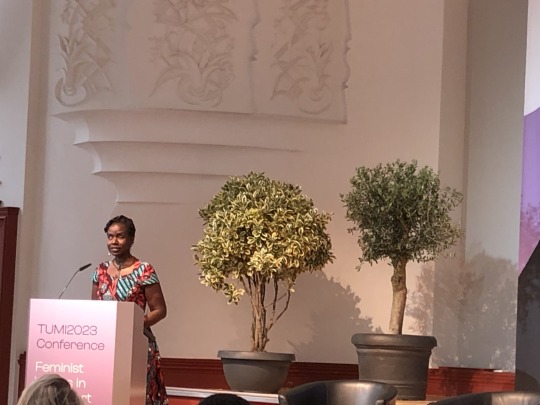
Senator Crystal Asige from Kenya, during her keynote speech.
In the last panel discussion, the aforementioned wo/men leaders and experts of mobility spoke about the way forward and how to implement and finance Gender-Transformative measures in the Urban Transport sector. Dr. Abou-Zeid particularly spoke about Africa and the potential African nations have in leapfrogging and working out a more sustainable urban mobility reality in African cities and metropolises.
At the end of the day, Mary Crass - the head of Institutional Relations and summit at the International Transport Forum (at the OECD) - summarized some of the main findings from the “Women mobilize women 2023” conference. She stressed the importance of continuing to work together, grounding our reports in reality, the need to dig a little deeper into the OECD findings report, and announced that a gender toolkit is now online and available for experts and other stakeholders in the field.
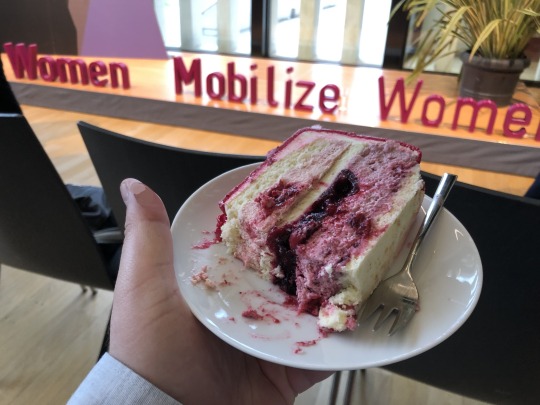
Caption of photo above: "Let's fight for equality AND have some cake!" The organizers of the conference brought in cake for all the participants in celebration of TUMI's "Women Mobilize Women" initiative’s anniversary.
Caption of Photo below: Screenshot of the Global Network for Popular Transport website.

Main highlight: “Popular Transport” instead of “Informal Transport”.
Andrea San Gil Leon from the Global Network for Popular Transportation introduced a concept to the conference that I think is - from my personal experience of someone growing up in the Global South - essential and overlooked despite its importance and salience. San Gil Leon proposes that as researchers, leaders, and experts we should refrain from the word “informal” when describing non-government-owned modes of transport in the Global South such as Service cars, Microbuses, Tuktuks, and rickshaws. Instead, a more honest term that does not carry the same negative connotation would be “popular transport”. These modes of transit might suffer from a lot of issues and in some cases may be problematic in certain cities. However, they are only so, because of how they have been approached, studied, and in most cases made illegal or placed in a legal gray zone with the aim of removing them off the streets without necessarily providing any genuine reliable alternatives.
Approaching individual-owned and operated modes of public transport as a “popular” transport helps with its regulation, its development, and its integration into the modal split of systems. It also takes into account the households and families that rely on income-based from the operation of such vehicles, either directly as the families of the drivers/owners, the feeding industries of repair and maintenance, and those who rely on such popular transit to go to work, schools, markets and access government and social services.
For more information on this concept, and on the work of the Global Network for Popular Transportation, visit their website: https://www.populartransport.net/
#Tumi 2023#Feminism#Feminist voices#Transport#sustainable mobility#Equality#Disability rights#rights of BIPOC#the right to the city
0 notes
Text
Recommended reading for leftists
Introduction and disclaimer:
I believe, in leftist praxis (especially online), the sharing of resources, including information, must be foremost. I have often been asked for reading recommendations by comrades; and while I am by no means an expert in leftist theory, I am a lifelong Marxist, and painfully overeducated. This list is far from comprehensive, and each author is worth exploring beyond the individual texts I suggest here. Further, none of these need to be read in full to derive benefit; read what selections from each interest you, and the more you read the better. Many of these texts cannot truly be called leftist either, but I believe all can equip us to confront capitalist hegemony and our place within it. And if one comrade derives the smallest value or insight herefrom, we will all be better for it. After all... La raison tonne en son cratère. Alone we are naught, together may we be all. Solidarity forever.
***
(I have split these into categories for ease of navigation, but there is plenty of overlap. Links included where available.)
Classics of socialist theory
~
Capital (vol.1) by Karl Marx Marx’s critique of political economy forms the single most significant and vital source for understanding capitalism, both in our present and throughout history. Do not let its breadth daunt you; in general I feel it’s better to read a little theory than none, but nowhere is this truer than with regards to Capital. Better to read 20 pages of Capital than 150 pages of most other leftist literature. This is not a book you need to ‘finish’ in order to benefit from, but rather (like all of Marx’s work) the backbone of theory which you will return to throughout your life. Read a chapter, leave it, read on, read again. https://www.marxists.org/archive/marx/works/download/pdf/Capital-Volume-I.pdf
The Prison Notebooks by Antonio Gramsci In our current epoch of global neoliberal capitalism, Gramsci’s explanation of hegemony is more valuable than much of the economic or outright revolutionary analyses of many otherwise vital theory. Particularly following the coup attempt and election in America, as well as Brexit and abusive government responses to Covid, but the state violence around the world and the advent of fascism reasserts Gramsci as being as pertinent and prophetic now as amidst the first rise of fascism. https://abahlali.org/files/gramsci.pdf
Imperialism: The Highest Stage Of Capitalism by V.I. Lenin Like Marx, for many Lenin’s work is the backbone of socialist theory, particularly in pragmatic terms. In much of his writing Lenin focuses on the practical processes of revolutionary transition from capitalism to communism via socialism and proletarian leadership (sometimes divisively among leftists). Imperialism is perhaps most valuable today for addressing the need for internationalist proletarian support and solidarity in the face of global capitalist hegemony, arguably stronger today than in Lenin’s lifetime. https://www.marxists.org/archive/lenin/works/1916/imp-hsc/imperialism.pdf
Socialism: Utopian And Scientific by Friedrich Engels Marx’s partner offers a substantial insight into the material reality of socialism in the post-industrial age, offering further practical guidance and theory to Marx and Engels’ already robust body of work. This highlights the empirical rigour of classical Marxist theory, intended as a popular text accessible to proletarian readers, in order to condense and to some extent explain the density of Capital. Perhaps even more valuable now than at the time it was first published. https://www.marxists.org/archive/marx/works/1880/soc-utop/index.htm
In Defense Of Marxism by Leon Trotsky It has been over a decade since I have read any Trotsky, but this seems like a very good source to get to grips with both classical Marxist thought and to confront contemporary detractors. In many ways, Trotsky can be seen as an uncorrupt symbol of the Leninist dream, and in others his exile might illustrate the dangers of Leninism (Stalinism) when corrupt, so who better to defend the virtues of the system many see as his demise? https://www.marxists.org/archive/trotsky/idom/dm/dom.pdf
The Conquest Of Bread by Pyotr Kropotkin Krapotkin forms the classical backbone of anarchist theory, and emerges from similar material conditions as Marxism. In many ways, ‘the Bread book’ forms a dual attack (on capitalism and authoritarianism of the state) and defence (of the basic rights and needs of every human), the text can be seen as foundational to defining anarchism both in overlap and starkly in contrast with Marxist communism. This is a seminal and eminent text on self-determination, and like Marx, will benefit the reader regardless of orthodox alignment. https://libcom.org/files/Peter%20Kropotkin%20-%20The%20Conquest%20of%20Bread_0.pdf
Leftism of the 20th Century and beyond
~
Freedom Is A Constant Struggle: Ferguson, Palestine, And The Foundations Of A Movement by Angela Davis This is something of a placeholder for Davis, as everything she has ever put to paper is profoundly valuable to international(ist) struggles against capitalism and it’s highest stage. Indeed, the emphasis on the relationship between American and Israeli racialised state violence highlights the struggles Davis has continually engaged since the late 1960s, that of a united front against imperialist oppression, white supremacists, patriarchal capitalist exploitation, and the carceral state. https://www.docdroid.net/rfDRFWv/freedom-is-a-constant-struggle-pdf#page=6
Postmodernism, Or, The Cultural Logic Of Late Capitalism by Frederic Jameson A frequent criticism of Marxism is the false claim that it is decreasingly relevant. Here, Jameson presents a compelling update of Marxist theory which addresses the hegemonic nature of mass media in the postmodern epoch (how befitting a tumblr post listing leftist literature). Despite being published in the early ‘90s, this analysis of late capitalism becomes all the more pertinent in the age of social media and ‘influencers’ etc., and illustrates just how immortal a science ours really is. https://is.muni.cz/el/1423/jaro2016/SOC757/um/61816962/Jameson_The_cultural_logic.pdf
The Ecology Of Freedom: The Emergence And Dissolution Of Hierarchy by Murray Bookchin I have not read this in depth, and take issue with some of Bookchin’s ideas, but this seems like a very good jumping off point to engage with ecosocialism or red-green theory. Regardless of any schism between Marxist and anarchist thought, the importance of uniting together to stem the unsustainable growth of industrialised capitalism cannot be denied. Climate change is unquestionably a threat faced by us all, but which will disproportionately impact the most disenfranchised on the planet. https://theanarchistlibrary.org/library/murray-bookchin-the-ecology-of-freedom.pdf
Why Marx Was Right by Terry Eagleton I’ve only read excerpts of this; I know Eagleton better for his extensive work on Marxist literary criticism, postmodernity, and postcolonial literature, so I’m including this work of his as a means of introducing and engaging directly with Marxism itself, rather than the synthesis of diverse fields of analysis. But Eagleton generally does a very good job of parsing often incredibly dense concepts in an accessible way, so I trust him to explain something so obvious and self-evident as why Marx was right. https://filosoficabiblioteca.files.wordpress.com/2018/12/EAGLETON-Terry-Why-Marx-Was-Right.pdf
By Any Means Necessary by Malcolm X Malcolm X is one of the pre-eminent voices of the revolutionary black power movement, and among the greatest contributors to black/American leftist thought. This is a collection of his speeches and writings, in which he eloquently and charismaticly conveys both his righteous outrage and optimism for the future. Malcolm X’s explicitly Marxist and decolonial rhetoric is often downplayed since his assassination, but even the title and slogan is borrowed from Frantz Fanon.
Feminism and gender theory
~
Sister Outsider: Essays And Speeches by Audre Lorde The primary thrust of this collection is the inclusion of ‘The Master’s Tools Will Never Dismantle The Master’s House’, probably Lorde‘s most well known work, but all the contents are eminently worthwhile. Lorde addresses race, capitalist oppression, solidarity, sexuality and gender, in a rigourously rhetorical yet practical way that calls us to empower one another in the face of oppression. Lorde’s poetry is also great. http://images.xhbtr.com/v2/pdfs/1082/Sister_Outsider_Essays_and_Speeches_by_Audre_Lorde.pdf
Feminism Is For Everybody by bell hooks A seminal addition to Third Wave Feminist theory, emphasising the reality that the aim of feminism is to confront and dismantle patriarchal systems which oppress - you guessed it - everybody. This book approaches feminism through the lens of race and capitalism, feeding into the discourse on intersectionality which many of us now take as a central element of 21st Century feminism. https://excoradfeminisms.files.wordpress.com/2010/03/bell_hooks-feminism_is_for_everybody.pdf
Gender Trouble: Feminism And The Subversion Of Identity by Judith Butler Butler and her work form probably the single most significant (especially white) contribution to Third Wave Feminism, as well as queer theory. This may be a somewhat dense, academic work, but the primary hurdle is in deconstructing our existing perceptions of gender and identity, which we are certainly better equipped to do today specifically thanks to Butler. Vitally important stuff for dismantling hegemonic patriarchy. https://selforganizedseminar.files.wordpress.com/2011/07/butler-gender_trouble.pdf
Trans Liberation: Beyond Pink Or Blue by Leslie Feinberg Feinberg is perhaps the foundational voice in trans theory, best known for Stone Butch Blues, but this text seems like a good point to view hir push into mainstream acceptance where ze previously aligned hirself and trans groups more with gay and lesbian subcultures. A central element here is the accessibility and deconstruction of hegemonic gender and expression, but what this really expresses is a call for solidarity and support among marginalised classes, in a fight for our mutual visibility and survival, in the greatest of Marxist feminist traditions.
The Haraway Reader by Donna Haraway Haraway is perhaps better known as a post-humanist than a Marxist feminist, but in all honesty, I am not sure these can be disentangled so easily. My highest recommendation is the essay ‘A Cyborg Manifesto: Science, Technology, and Socialist-Feminism in the Late Twentieth Century‘, but it is in many ways concerned more with aesthetics and media criticism than anything practical, and Haraway’s engagement with technology has only become more significant, with the proliferation of smartphones and wifi, to understanding our bodies and ourselves as instruments of resistance. https://monoskop.org/images/5/56/Haraway_Donna_The_Haraway_Reader_2003.pdf
Postcolonialism
~
The Wretched Of The Earth by Frantz Fanon Perhaps my highest recommendation, this will give you better insight into late stage (postcolonial) capitalism than perhaps anything else. Fanon was a psychologist, and his analyses help us parse the internal workings of both the capitalist and racialised minds. I don’t see this work recommended nearly enough, largely because Fanon’s Black Skin, White Masks is a better source for race theory, but The Wretched Of The Earth is the best choice for understanding revolutionary, anti-capitalist, and decolonial ideas. http://abahlali.org/wp-content/uploads/2011/04/Frantz-Fanon-The-Wretched-of-the-Earth-1965.pdf
Orientalism by Edward Said This is probably the best introduction to postcolonial theory, particularly because it focuses on colonial/imperialist abuses in media and art. Said’s later work Culture And Imperialism may actually be a better source for strictly leftist analysis, but this is the groundwork for understanding the field, and will help readers confront and interpret everything from Western military interventionism to racist motifs in Disney films. https://www.eaford.org/site/assets/files/1631/said_edward1977_orientalism.pdf
Decolonisation Is Not A Metaphor by Eve Tuck and K. Wayne Yang In direct response to Fanon’s call to decolonise (the mind), Tuck and Yang present a compelling assertion that the abstraction of decolonisation paves the way for settler claims of innocence rather than practical rapatriation of land and rights. The relatively short article centres and problematises ongoing complicity in the agenda of settler-colonial hegemony and the material conditions of indigenous groups in the postcolonial epoch. Important stuff for anti-imperialist work and solidarity. https://clas.osu.edu/sites/clas.osu.edu/files/Tuck%20and%20Yang%202012%20Decolonization%20is%20not%20a%20metaphor.pdf
The Coloniser And The Colonised by Albert Memmi Often read in tandem with Fanon, as both are concerned with trauma, violence, and dehumanisation. But further, Memmi addresses both the harm inflicted on the colonised body and the colonisers’ own culture and mind, while also exploring the impetus of practical resistance and dismantling imperialist control structures. This is also of great import to confronting detractors, offering the concrete precedent of Algerian decolonisation. https://cominsitu.files.wordpress.com/2020/05/albert-memmi-the-colonizer-and-the-colonized-1.pdf
Can The Subaltern Speak? by Gayatri Spivak This relatively short (though dense) essay will ideally help us to confront the real struggles of many of the most disenfranchised people on earth, removing us from questions of bourgeois wage-slavery and focusing on the right to education and freedom from sexual assault, not to mention the legacy of colonial genocide. http://abahlali.org/files/Can_the_subaltern_speak.pdf
Wider cultural studies
~
No Logo by Naomi Klein I have some qualms with Klein, but she nevertheless makes important points regarding the systemic nature of neoliberal global capitalism and hegemony. No Logo addresses consumerism at a macro scale, emphasising the importance of what may be seen as internationalist solidarity and support and calling out corporate scapegoating on consumer markets. I understand that This Changes Everything is perhaps even better for addressing the unreasonable expectations of indefinite and unsustainable growth under capitalist systems, but I haven’t read it and therefore cannot recommend; regardless, this is a good starting point. https://archive.org/stream/fp_Naomi_Klein-No_Logo/Naomi_Klein-No_Logo_djvu.txt
The Black Atlantic: Modernity And Double Consciousness by Paul Gilroy This is an important source for understanding the development of diasporic (particularly black) identities in the wake of the Middle Passage between African and America, but more generally as well. This work can be related to parallel phenomena of racialised violence, genocide, and forced migration more widely, but it is especially useful for engaging with the legacy of slavery, the cultural development of blackness, and forms of everyday resistance. https://dl1.cuni.cz/pluginfile.php/756417/mod_resource/content/1/Gilroy%20Black%20Atlantic.pdf
Imagined Communities: Reflections On The Origin And Spread Of Nationalism by Benedict Anderson This text is important in understanding the nature of both high colonialism and fascism, perhaps now more than ever. Anderson examines the political manipulation and agenda of cultural production, that is the propagandised, artificial act of nation building. This analyses the development of nation states as the norm of political unity in historiographical terms, as symptomatic of old school European imperialism. Today we may see this reflected in Brexit or MAGA, but lebensraum and zionism are just as evident in the analysis. https://is.muni.cz/el/1423/jaro2016/SOC757/um/6181696/Benedict_Anderson_Imagined_Communities.pdf
Discipline And Punish: The Birth Of The Prison by Michel Foucault Honestly, I am not sure if this should be on this list; I would certainly not call it leftist. That said, it is a very important source to inform our perceptions of the nature of institutional power and abuse. It is also unquestionable that many of the pre-eminent left-leaning scholars of the past fifty years have been heavily influenced, willing or not, by Foucault and his post-structuralist ilk. A worthwhile read, especially for queer readers, but take with a liberal (zing!) helping of salt. https://monoskop.org/images/4/43/Foucault_Michel_Discipline_and_Punish_The_Birth_of_the_Prison_1977_1995.pdf
Trouble In Paradise: From The End Of History To The End Of Capitalism by Slavoj Žižek Probably just don’t read this, it amounts to self-torture. Okay but seriously, I wanted to include Žižek (perhaps against my better judgement), but he is probably best seen as a lesson in recognising theorists as fallible, requiring our criticism rather than being followed blindly. I like Žižek, but take him as a kind of clown provocateur who may lead us to explore interesting ideas. He makes good points, but he also... Doesn’t... Watch a couple youtube videos and decide if you can stomach him before diving in.
Additional highly recommended authors (with whom I am not familiar enough to give meaningful descriptions or specific recommended texts) (let me know if you find anything of significant value from among these, as I am likely unaware!):
Theodor Adorno (of the Frankfurt School, which also included Herbert Marcuse, Erich Fromm, and Walter Benjamin, all of whom I’d likewise recommend but with whom I have only passing familiarity) was a sociologist and musicologist whose aesthetic analyses are incredibly rich and insightful, and heavily influential on 20th Century Marxist theory.
Sara Ahmed is a significant voice in Third Wave Feminist criticism, engaging with queer theory, postcoloniality, intersectionality, and identity politics, of particular interest to international praxis.
Mikhail Bakhtin was a critic and scholar whose theories on semiotics, language, and literature heavily guided the development of structuralist thought as well as later Marxist philosophy.
Mikhail Bakunin is perhaps the closest thing to anarchist orthodoxy. Consistently involved with revolutionary action, he is known as a staunch critic of Marxist rhetoric, and a seminal influence on anti-authoritarian movements.
Silvia Federici is a Marxist feminist who has contributed significant work regarding women’s unpaid labour and the capitalist subversion of the commons in historiographical contexts.
Mark Fisher was a leftist critic whose writing on music, film, and pop culture was intimately engaged with postmodernity, structuralist thought, and most importantly Marxist aesthetics.
Che Guevara was a major contributor to revolutionary efforts internationally, most notably and successfully in Cuba. His writing is robustly pragmatic as well as eloquent, and offers practical insight to leftist action.
Hồ Chí Minh was a revolutionary communist leader of the Democratic Republic of Vietnam, and a significant contributor to revolutionary communist theory and anti-imperialist practice.
C.L.R. James is a significant voice in 20th Century (especially black) Marxist theory, engaging with and criticising Trotskyist principles and the role of ethnic minorities in revolutionary and democratic political movements.
Joel Kovel was a researcher known as the founder of ecosocialism. His work spans a wide array of subjects, but generally tends to return to deconstructing capitalism in its highest stage.
György Lukács was a critic who contributed heavily to the Western Marxism of the Frankfurt School and engaged with aesthetics and traditions of Marx’s philosophical ideology in contrast with Soviet policy of the time.
Rosa Luxemburg was a revolutionary socialist organiser, publisher, and economist, directly engaged in practical leftist activity internationally for a significant part of the early 20th Century.
Mao Zedong was a revolutionary communist, founder and Chairman of the People’s Republic of China, and a prolific contributor to Marxism-Leninism(-Maoism), which he adapted to the material conditions outside the Western imperial core.
Huey P. Newton was the co-founder of the Black Panther Party and a vital force in the spread and accessibility of communist thought and practical internationalism, not to mention black revolutionary tactics.
Léopold Sédar Senghor was a poet-turned-politician who served as Senegal’s first president and established the basis for African socialism. Also central to postcolonial theory, and a leader of the Négritude movement.
***
I hope this list may be useful. (I would also be interested to see the recommendations of others!) Happy reading, comrades. We have nothing to lose but our chains.
#original#leftism#leftist#Marxist#Marxism#socialist#socialism#literature#reading list#critical theory
1K notes
·
View notes